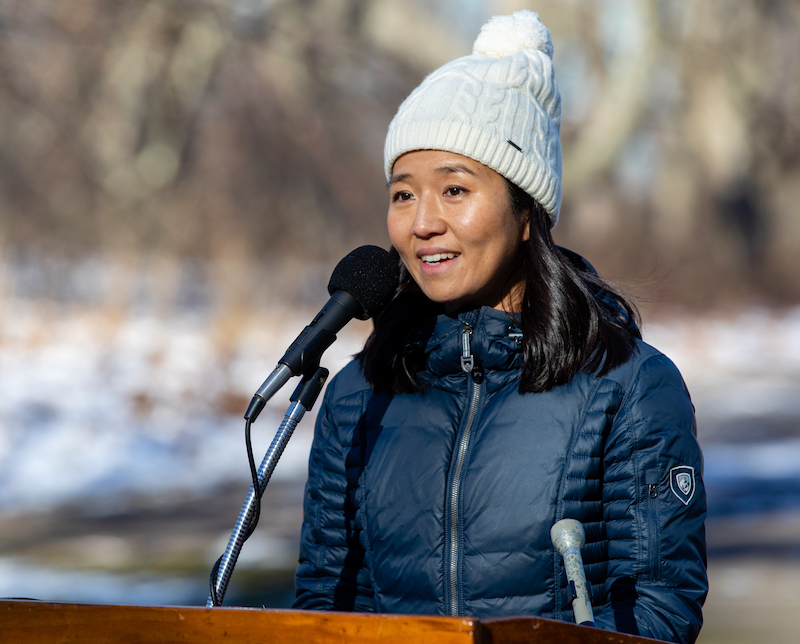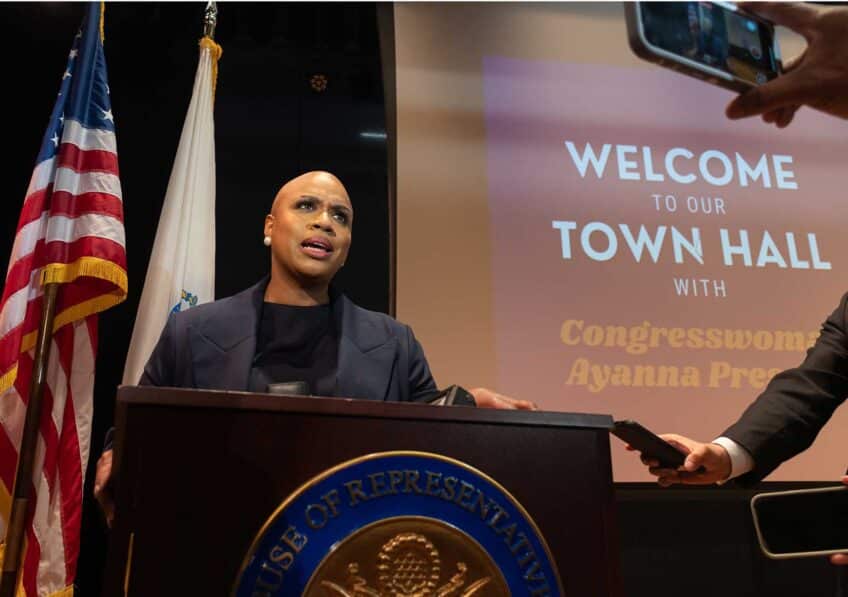Wu boosts affordability requirements for new development
IDP, linkage fees set to increase under proposal

Calling housing affordability “our most pressing challenge in the city,” Mayor Michelle Wu announced a new set of proposed changes to two of the city’s main affordable housing policies — the Inclusionary Development Policy (IDP), which requires a proportion of designated-affordable units be included in certain new residential development; and the city’s commercial linkage policies, which apply to larger-scale commercial developments.
The move came less than a week after Boston City Council members passed a resolution calling on Mayor Wu to lower the building size threshold at which the IDP policy applies and to raise affordability requirements.
Currently, the IDP requires that in developments of 10 units or more, 13% of units be set aside as affordable. Affordability levels are defined according to the area median income, which is determined by the U.S. Department of Housing and Urban Development (HUD).
Under the mayor’s proposal, the IDP policy would be broadened in certain parts of the city to apply to new construction of seven units or more, and the affordability requirements would be raised to 20% of units. The proposal would further require that 3% of units be reserved for residents holding state or federal rental aid vouchers.
On the commercial side, the mayor’s new policies would lower the size at which projects are subject to the city’s linkage fee from 100,000 square feet to 50,000 square feet; and would increase the fee itself from about $23 per square foot to about $31. Those funds would continue to go mostly to the creation and preservation of affordable housing, with 16% reserved for job training and readiness programs.
The new measures come in the form of proposed changes to the city’s zoning code, rather than as executive orders, which have in the past governed the IDP and linkage policies. This legal maneuver is newly available to Mayor Wu after the passage of a home rule petition sponsored by former mayor Marty Walsh to allow Boston, like other Massachusetts municipalities, to institute affordable housing requirements via local zoning laws.
“We want to ensure that we are boosting affordability through every possible pool,” Wu said, “and achieving a balance that empowers us to continue growing as a city and continue boosting the supply of housing.”
Along with the stronger affordability requirements, Wu is supporting a raft of internal reforms within the Boston Planning and Development Agency (BPDA) aimed at increasing “predictability” in city development processes. These reforms include creating a standard scorecard by which developers can measure and track their progress through city bureaucracies.
“We have to introduce predictability and more predictability into the work we’re doing,” said BPDA Director James Jemison. “Creating predictability for everyone, where everyone knows, and we can actually deliver on approval within the time frame advertised, is the number one thing we are focused on.”
The announcement was greeted enthusiastically by at least some members of the Boston City Council, where the mayor’s final proposals around IDP must withstand a potential veto by two-thirds of Council members.
District 6 Councilor Kendra Lara, who chairs the Council’s Committee on Housing and Community Development and was among those councilors calling for such measures, called the move “an incredibly forward-looking plan.” She noted she is especially pleased by not only the increased affordability requirements, but also the proposed set-aside for households with rental vouchers.
“I think we’re really taking a step in the right direction,” said Lara, “and I look forward to the public comment process.”
At-large Councilor Ruthzee Louijeune called the proposals “great steps” toward more affordability, for working people of color especially, and noted that households with rental vouchers often face discrimination in rental markets.
Louijeune also praised the changes to the city’s linkage fees.
“We know the market can bear the increase,” Louijeune said. “All these [measures] are about how do we get more dollars into city coffers, so folks aren’t just extracting more wealth” from Boston neighborhoods.
Other Council members were less enthusiastic.
“I think that businesses have a whole lot of challenges in front of them and a whole lot of unknown in front of them,” said District 3 Councilor Frank Baker. “I think it’s going to adversely affect the building that happens in the city.”
Those sentiments were echoed by at-large Councilor Michael Flaherty, who in a statement said he has “concerns about the current market at play,” citing rising interest rates and the possibility of further economic slowdown.
Meanwhile, at least some affordable housing activists are voicing their own concerns — that the proposals don’t go far enough.
In a statement, the Coalition for a Truly Affordable Boston said they are “glad to see that Mayor Wu sees the urgency of the affordable housing and displacement crisis,” but called the standards by which units are designated “affordable” unrealistic for working-class families, especially those of color.
“Her current proposal falls far short of what is needed, and most of the IDP units are still not actually affordable to Boston residents who are struggling,” the statement read.
The group also criticized the mayor’s inclusionary development proposals for leaving alone existing (lower) affordability requirements in certain parts of the city — notably, the lowest-income communities, which are predominantly communities of color — “despite the well-known fact that these communities are the most displaced and harmed by the lack of truly affordable home-ownership opportunities.”
The city’s real estate and development interests, generally not shy to oppose requirements that they argue could stifle growth, have so far sounded a notably mild note regarding Wu’s proposals.
In a statement, Greater Real Estate Board spokesman Greg Vasil said: “We agree with Mayor Wu; Boston, and the region, are experiencing an unprecedented housing crisis that requires bold solutions to address.”
“While we are traditionally skeptical of government regulations placed on the real estate industry, we hope that policies like IDP reform may prove successful if they allow the real estate industry creativity and flexibility in their approach to zoning.”






